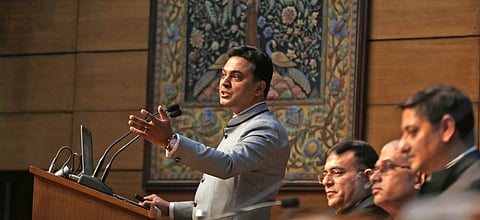

India needs capitalists and the government should embrace free-market principles and follow laissez-faire economics to aid growth, according to the Economic Survey 2019-20 presented Friday.
Chief Economic Adviser K V Subramanian's policy prescription for a sagging economy is thus simple: Encourage wealth creators, adopt free markets and eliminate government intervention. Get this right and the economy and growth will take care of themselves. Starkly, this economic doctrine first propagated by Adam Smith, comes amid the opposition's staunch suit-boot-ki-sarkar jibe against the Narendra Modi-led government.
If in his first Economic Survey, Subramanian favoured an investment-led economic growth, the latest is a sequel suggesting that wealth creation indeed comes from individuals and that governments have no business to be in business. It remains to be seen if Finance Minister Nirmala Sitharaman will accept the recommendations in toto.
According to Subramanian, India's success during sunnier days was largely due to the invisible hand of the market, which he believes didn't happen by default but by design. "Despite the dalliance with socialism – four decades is but an ephemeral period in history of millennia – India has embraced the market model that represents our traditional legacy. However, scepticism about the benefits accruing from a market economy still persists," the Survey noted.
For a $5 trillion economy, it's critical to strengthen the invisible hand of markets by supporting pro-business policies such as eliminating unnecessary government intervention, providing a level-playing field for new players and ensuring fair competition and ease of doing business.
The good news from the Survey though is that growth has bottomed out and is expected to rebound to 6-6.5 per cent in FY21 from the projected 5 per cent in FY20. Admitting that the slack in private investments and the flaws of financial sector dragged growth to a decade-low, the Survey confirmed that 5 per cent growth is the lowest it could fall for now.
Meanwhile, the Survey invoked the Thatchersque ideas of privatizing state-run enterprises en masse. With evidence on his side, Subramanian concluded that disinvestment of public sector enterprises unlocks potential, creates wealth, and improves performance. If the government wants profits, disinvestment is the way to go, he stressed.
As we await job creation with breathless anticipation, the Survey suggests that the government bank on the old saw -- manufacturing, specifically assembling. Why? Assemble-in-India can create 4 crore well-paid jobs by 2025 and 8 crore by 2030. Exports of network products, which is expected to equal $7 trillion worldwide in 2025, can contribute a quarter of the increase in value added for the $5 trillion economy by 2025, it noted.
PSBs that account for 70 per cent of the market share in Indian banking are inefficient on most performance parameters. Alarmingly, in 2019, every rupee of taxpayer money invested in PSBs on an average lost 23 paise, while private banks fetched 9.6 paise.
In the past five years, more than Rs 3 lakh crore has been pumped into state-run banks and the Survey rightly asks how beneficial was this endless shoring up by taxpayers? The answers it found were astounding. Every rupee we pump in fetches a market value of 71 paise. But put the same money in new private banks and it'll pay back five times more or Rs 3.70.
Subramanian acknowledged the contribution of PSBs to nation-building in the past 50 years following bank nationalization in 1969 but stopped short of suggesting the way forward. Though an entire chapter was dedicated to privatization, the Survey remained silent on whether banks should be privatized. However, he underscored the need for Indian banks to figure among the global 100. Currently, only SBI is there but by the time we hit $5 trillion, the Survey aspires to have at least eight. The Survey, however, misses the go-to strategy for this.
The CEA also mentioned the ongoing crisis among NBFCs, which cater to over 20 per cent of the country's credit needs, but gave no policy prescriptions to get them out of the rut. Instead, he helped build a health index to track their progress.
The Survey, refreshingly, produced an interesting chapter titled Thalinomics depicting the absolute price fluctuations of a vegetarian thali over the past four years. For instance, post 2015-16, an average household gained close to Rs 11,000 on average per year from the moderation in prices in the case of vegetarian thalis, the Survey says. An average household that consumes two non-vegetarian thalis gained close to Rs 12,000 on average per year during the same period.